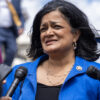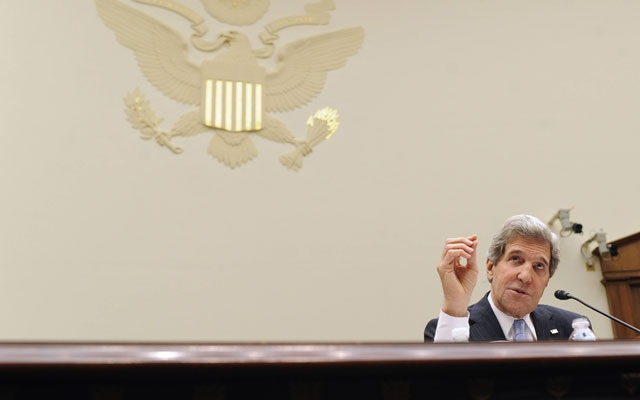Kudos to members of the House Foreign Affairs Committee for squarely placing Benghazi on the table at today’s hearing with Secretary of State John Kerry. Kerry’s answers were nothing less than shocking.
What we learned is that State is conducting yet another internal review of Benghazi, initiated by Kerry himself immediately after taking office and allegedly due soon. This amounts to a huge indictment of the credibility of Kerry’s predecessor Hillary Clinton and of the investigation by the State Department’s Accountability Review Board. Clearly, even John Kerry is not confident in the Obama Administration’s version of events.
Kerry promised the committee that he would “clear the air,” though he also repeatedly used the phrase that clearing the air needs to be done “so we can move on” to far more important issues.
In the breadth of issues covered in the hearing, from North Korea’s nuclear threats to Middle East peace to the disputed Venezuelan elections, the urgency and specificity of the members’ many Benghazi questions stood out. No one likes being given the run-around accorded the congressional committees by former Secretary of State Hillary Clinton. As Representative Dana Rohrabacher (R–CA) stated, shaking with anger: “I do not believe Secretary of State Clinton was cooperating fully with this committee. We think there was a cover up of some kind of wrong doing.”
However, if—a big if, admittedly—Kerry keeps the commitments made at Thursday’s hearing, there could be a breakthrough in understanding the egregious lapses in security that left the Benghazi consulate vulnerable to the September 2012 attack, which killed four Americans, including U.S. ambassador to Egypt Christopher Stevens.
- In response to Rohrabacher’s complaint that access to the survivors of Benghazi had been withheld from the committee, Kerry interestingly revealed that as a Senator, he had known their identities. He promised to appoint someone tomorrow to get the committee the answers, documents, and access that the committee doesn’t feel it is getting. Seven months after the terrorist attack, “Let’s together find out what happened,” said Kerry.
- In response to a question by Representative Michael McCall (R–TX) about accountability in the State Department bureaucracy for neglecting Ambassador Stevens’s requests for additional security, Kerry promised McCall to share the results of his internal review as to who at State was negligent. “Sure. You have every right to know,” Kerry said. Asked by chairman Ed Royce (R–CA) if he would share the report itself, however, Kerry demurred.
- In response to a question by Representative Ted Poe (R–TX) about the lack of progress in the investigation of the murders, Kerry explained that one of his first actions in office was to consult with FBI director Robert Mueller. “We are building a case,” he said. “We will find justice here.” The wheels of justice have moved with glacial pace in Benghazi, and the Administration should show it is stepping up.
What Kerry did not promise was to investigate the misleading statements made by U.N. Secretary Susan Rice on September 16 on the Sunday talk shows. Representative Mo Brooks (R–AL) got an unusually straight “no” to his question of whether Kerry was investigating Rice’s part in spreading false information in the aftermath of the attack.
Kerry himself has an opportunity, however, to establish greater trust between the Obama Administration and Members of Congress by providing real answers to its legitimate questions. This is critically important—not in order to “move on” but fix diplomatic security for those who serve this country.


























